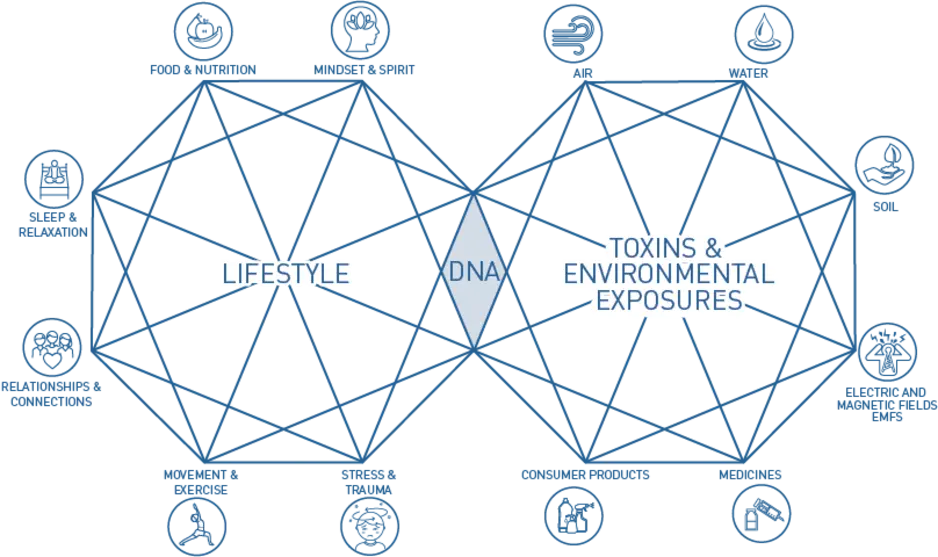Factors influencing health today
Our DNA Is Our Ancestry, Not Our Destiny
Today’s chronic disease crisis is undeniable. The good news is that new evidence-based research is proving that while our DNA may be our ancestry, it is not necessarily our destiny.
90% of the risks of chronic disease are due to non-genetic factors.
Health is influenced in part by access to social and economic opportunities and "our gene expression is altered by numerous influences including environment, lifestyle, diet, activity patterns, psycho-social-spiritual factors, and stress! These lifestyle choices and environmental exposures can push us toward (or away from) disease by turning on – or off – certain genes."
Dr. Jeffrey Bland
DNA & Genetics
Since the advent of the Human Genome Project in 2000, we are learning that our DNA is important in influencing our health; however, our DNA does not mean inevitable genetic inheritance of disease. Genes encode our uniqueness and they respond to the circumstances of our environment and to our own individual behaviors.
“Individual genes are stimulated by and respond to what is going on around us and the kinds of lifestyle behaviors we practice. If we change our environment and our lifestyle behaviors – we can change the way our genes get fueled and the way they respond and since genes regulate or direct our biological functions, that can also change the shape of our health.”
Dr. Jeffery Bland, The Disease Delusion © 2014
“Although individual genes may make you more susceptible to some diseases, your DNA is not an unchangeable blueprint of your life. Emerging research shows that your genes may be influenced by everything in your environment, as well as your experiences, attitudes and beliefs. That means it is possible to change the way genes are activated or expressed.” IFM.org
Environmental Exposure Factors
Air
Water
Soil and Food – source, quality, and nutrients
Consumer Products – personal, home, office
Injectables/Ingestibles – over-the-counter and pharmaceutical medications and vaccines
Electromagnetic Force (EMF)
The air you breath, the water you drink, the quality of the food available to you, toxic exposures, what you ingest, inhale, and inject, and the products you come in contact with and put on your body all affect your health.
Lifestyle Factors
Mental, Emotional, and Spiritual Influences
Experiences, Attitudes, and Beliefs
Social Wellness – relationships and connections
Stress andTrauma
Sleep and Relaxation
Nutrition
Exercise and Movement
The mind-body connection is real. Psychological, social, and spiritual factors, the level of physical activity and stress, the amount and quality of sleep and relaxation, as well as the traumas that you have experienced, have a significant influence on your health and well-being.
Causes, Symptom Precursors, and Triggers of Dysfunction
According to The Institute of Functional Medicine, environmental and lifestyle factors when combined with your unique genetic makeup influence individual body processes and systems. When these processes are disturbed, they may create core imbalances at the cellular level and impact how cells function, repair, and maintain themselves. They lead to symptoms, which can lead to disease if effective interventions are not applied. These imbalances and the affected body processes and functions include:
Assimilation Imbalances
Digestion
Absorption
Microbiota/Gastro-Intestinal Tract
Respiration
Defense and Repair Imbalances
Immune System
Inflammatory Processes
Infection and Microbiota
Energy Imbalances
Energy Regulation
Mitochondrial Function
Biotransformation and Elimination Imbalances
Toxicity
Detoxification
Communication Imbalances
Endocrine
Neurotransmitters
Immune Messengers
Cognition
Structural Integrity Imbalances
From sub-cellular membranes to the musculoskeletal system
Psychological and Spiritual Imbalances
Mental, Emotional, Spiritual Influences
Social and Environmental Determinants of Health
Health is influenced in part by: access to social and economic opportunities; the resources and support available in our homes, neighborhoods, and communities; the quality of our schooling; the safety of our workplaces; the cleanliness of our water, food, and air; and the nature of our social interactions and relationships. The conditions in which we live explain in part why some Americans are healthier than others and why Americans more generally are not as healthy as they could be. Higher levels of socioeconomic deprivation are associated with increased risks of adverse health and healthcare outcomes.
US Government Office of Disease Prevention and Health Promotion

